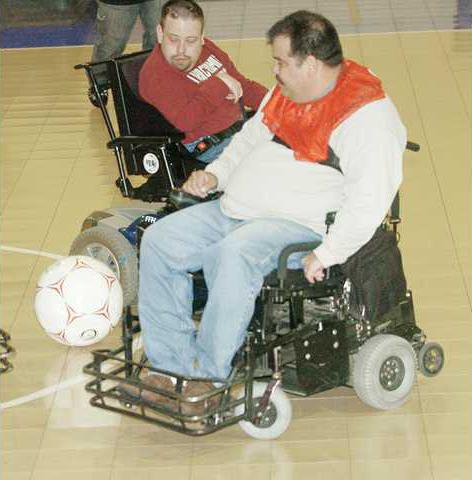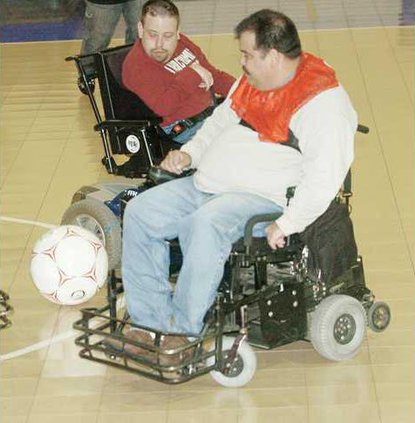Unlike other sports teams, the Screamin Eagles have no need for special shoes that make them run faster or jump higher. They only need eight guys, a soccer ball, charged batteries and a guard.
The North Georgia Screamin Eagles is one of only four power wheelchair soccer teams in Georgia. The year-old team has played teams from Alabama, Florida, Missouri and Indiana, and right now, gets a chance to compete about once a month.
"We would like to get it where we could play on a more regular basis," said Marci Summer, the team’s coach and the facility manager for the South Hall Community Center.
Power soccer, as the players call it, is little-known in the Southeast, but the Fernando Foundation in Duluth is spreading the word. Jerry Frick, director of community services for the Fernando Foundation, switched coasts from California with his friend Eric Dornan seven years ago after Dornan’s parents moved their company to Georgia.
Dornan originally did not want to come to Georgia, because there were no power soccer teams. But his caregiver, Fernando Ruelas, told Dornan that they could build a team in Georgia if he wanted to be near his family.
Dornan recruited some of his teammates from California, Frick included, to start a team on the East Coast.
Their first team was the Atlanta Shepherd Strikers, a team from the Shepherd Center, a spinal and brain injury rehabilitation center in Atlanta.
Ruelas had a dream of building more teams, but he died before he achieved that goal. Frick, Dornan and Ruelas’ brother, David, carried on the dream with the Fernando Foundation. They toured muscular dystrophy camps, teaching the skills of the sport, and held clinics for anyone interested in starting a team.
A year ago, Justin Pressley of Gainesville contacted Frick about starting a team in Hall County. Pressley and Summer, friends from high school, organized a clinic in Hall County to try to recruit team members.
Only three people showed up. Since then, Summer and Pressley have spread the word and recruited three more players.
"The thing with disability sport, is word of mouth is your best way to build it," said Summer, who has a background in recreation therapy.
Summer said she keeps her business card with her at all times.
"It’s a matter of seeing (disabled people) out there and approaching them," Summer said.
Frick agrees. He carries promotional material with him everywhere he goes.
Through word-of-mouth the Fernando Foundation has established four teams in Georgia, is working on more teams in Tennessee, Louisiana and North Carolina, and has contacts in Australia, South Africa and Ecuador.
Power soccer is internationally recognized, and quite popular in Europe where there is a chair on the market made especially for the sport. Last year, organizers of the sport set official rules for the game and the United States brought home the first World Cup in power soccer.
Funding can be a hurdle for new teams, and the sport requires some expensive equipment, Frick said. The 13-inch regulation soccer ball can cost up to 80 dollars. Chair guards used to kick the ball can range anywhere from $140 to $400, depending on the quality.
One of the major hurdles, though, is transportation.
The Screamin Eagles try to practice every Wednesday, but it can be hard for all the players to make it.
"A lot of my guys can’t drive, so getting to and from practice has been a challenge for some of our players," Summer said.
Frick said transportation is an issue with a lot of teams, and the Fernando Foundation does what it can to help with transportation, picking up athletes for practices and donating vans to teams in need.
Although finances and transportation can be difficult, Frick and Summer agree that the sport is worth the extra work.
"The ability to participate in activities just allows them the freedom and autonomy that other people have," Summer said.
Athletes must be at least five years of age, but they can never be too old to play power soccer. Once, Frick encountered a 78-year-old woman playing the sport in New York.
"As long as you can drive your power chair, you can play the sport," Frick said
"That’s kind of the interesting thing," Summer said. "With power soccer you can have an eight, ten year old playing with a 60 year old."
Chairs are regulated at a maximum speed of 6.2 miles per hour for tournaments, and athletes do not slow down with age.
But smaller players do have an advantage over bigger athletes, Frick says.
"All these little ones that we’re teaching, they’re so quick in the chairs," Frick said. "It’s like nobody’s actually in the chair, because they’re so light."
"They get from point A to point B a lot faster than a big guy could."
The Screamin Eagles will kick off this year’s season Saturday in the Winter Blast Power Soccer Tournament. The team will host the tournament at the East Hall Community Center. The tourney, which will include teams from Atlanta and Chattanooga, Tenn., starts at 10 a.m.
After a motorcycle accident left him in a wheelchair in 1989, Frick found that his only outlet was sports. He started playing power soccer about four years later.
"It’s changed my life completely," Frick said.
The sport gives those whose social lives may suffer because of their disability a chance to get out of the house and compete.
Frick said a lot of times, kids with disabilities are left at home by parents who want to protect them and their lives are limited by their disabilities. But that’s not how it has to be.
"There are so many things we can do, it just takes time and a different way to do it," Frick said.
Several of the Screamin Eagles were athletes before they were injured. Pressley played football before he became confined to a wheelchair.
"This is really the only competitive sport (in the area) for people in wheelchairs," Pressley said.
And the Screamin Eagles are certainly competitive. They recently won first place at a Division II tournament in Alpharetta and second at another tournament in Chattanooga, Tenn.
"They’ll start mouthing off and talking trash," Summer said.
Competition aside, Frick insists that power soccer opens doors to people in wheelchairs.
"It brings people out of their shell," Frick said. "It shows (people in wheelchairs) there’s a whole life out there if they would like it."

